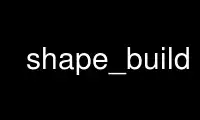
This is the command shape_build that can be run in the OnWorks free hosting provider using one of our multiple free online workstations such as Ubuntu Online, Fedora Online, Windows online emulator or MAC OS online emulator
PROGRAM:
NAME
shape_build - shapeTools RMS system building and installation
SYNOPSIS
shape [all][VERSIONS=<rule>] [variants] [macro settings]
shape install[VERSIONS=<rule>] [INSTALLBASE=<path>] [variants] [macro settings]
shape clean[<macro settings>]
shape cleancache [<macro settings>]
make [all][<macro settings>]
make install[INSTALLBASE=<path>] [<macro settings>]
make clean[<macro settings>]
DESCRIPTION
Shape all, or just shape (as all is the default target), builds the current system node.
It performs all necessary actions to derive the main target ($(TARGET) in the Makefile)
from the node's source components. Shape all also builds all subsystems of the current
node. Before triggering any build action itself, if recursively calls shape for each
subsystem. Version selection is driven by the rule given as value to the VERSIONS macro,
default is most_recent. The given version selection rule on the command line, if any, is
inherited to the recursive calls.
Shape install installs the build results of the current node in the appropriate locations.
Things to be installed are usually binaries and manuals. The target installtargets in the
Makefile lists all these things as its dependents. Shape install updates all build results
in the same way as shape all does, before installing them. Shape install invokes all
subsystems of the current node in the installation procedure by recursively calling shape
install for each of them. This is done, before it performs any build or install actions
itself. The appropriate versions are selected according to the given version selection
rule named in the VERSIONS macro. The default rule for shape install is recent_release
selecting the most recent release or prerelease (whichever is newer). The macro
INSTALLBASE defines the installation base directory, an absolute pathname pointing to the
root of a directory tree, where the build results are to be copied to. Check the Makefile
for the default setting of INSTALLBASE and the installation directories defined as
relative pathnames starting from the installation base directory. Values of the VERSION
and the INSTALLBASE macro set on the command line are inherited to all recursive calls.
Shape clean removes all derived objects currently established as UNIX files. These are the
files listed in the OBJECTS macro in the Makefile, the derived target ($(TARGET)), and the
target aliases ($(ALIASES)). The derived objects, established as UNIX files are those
being produced from their source or reinstalled from the derived object cache during the
last system build. Shape cleancache cleans up the derived object cache, will say, it
removes all objects stored there. All names listed as dependents of the .BPOOL special
macro in the Shapefile are candidates to be cached. When multiple (different) versions of
derived objects with the same name arise, the older ones are stored to the derived object
cache. Shape cleancache in conjunction with shape clean removes all derived (automatically
reproducible) objects. The two cleanup actions are not called recursively. They apply only
to the current node.
The build and cleanup actions (all, install and clean) of the shape RMS can be performed
by make(1) and by shape(1). The main difference is, that shape is capable of setting up
the appropriate source context according to a given version selection rule, while make
only regards the regular UNIX files. Make will fail if not every component of the system
has a checked out busy version. The intention for maintaining Makefiles suitable for
complete system builds aims at system building and installation from a source distribution
rather than from the development area. Source distributions are system copies taken from
one of the release trees (partial release area or release area). See shape_RMS(1) for
details.
Make all, make install and make clean behave similar to their shape counterparts. The
difference is, that they expect a complete system source context to be set up as UNIX
files (see above).
Each macro definition in the Make- or Shapefile may be redefined from the command line.
Most of the shape RMS standard macro definitions are inherited to recursive calls of make
or shape. Check the shape_tmpl(7) manual page for a list of the standard macros.
INCONVENIENCES
For technical reasons, each make call recursively invokes make on the same level before
performing any actions. This unfortunately restricts the efficacy of command line options.
E.g. there is no chance to work with the -f (alternate name for the Makefile) option and
the redefinition of macros is restricted to inherited ones. This restriction does not
apply to shape calls.
Use shape_build online using onworks.net services
